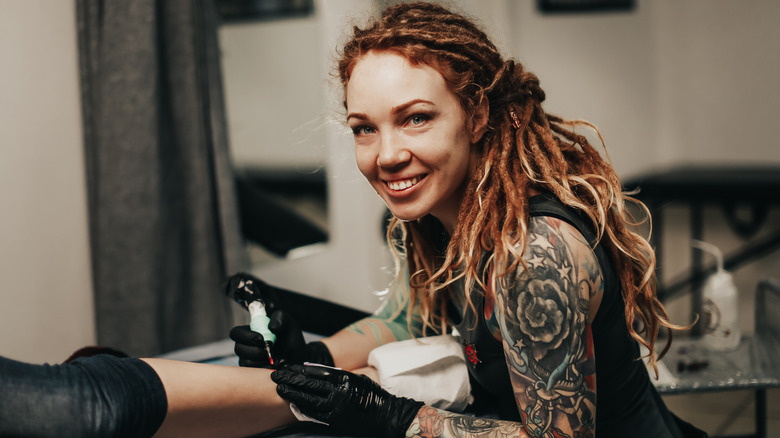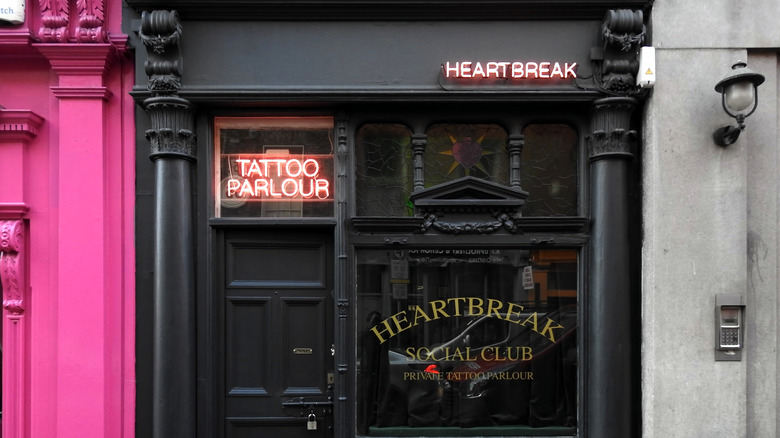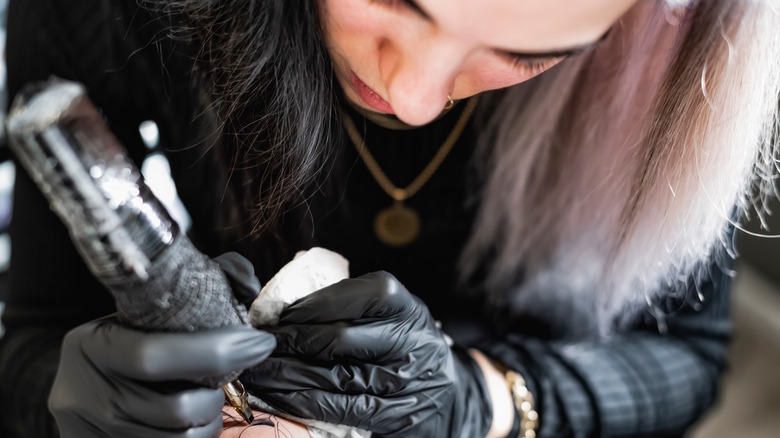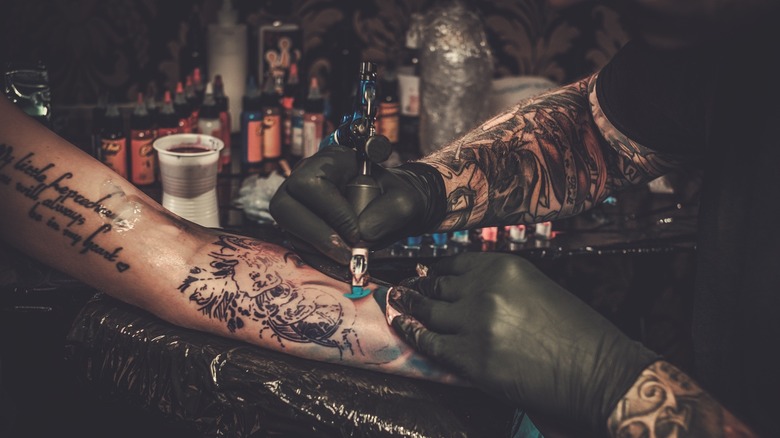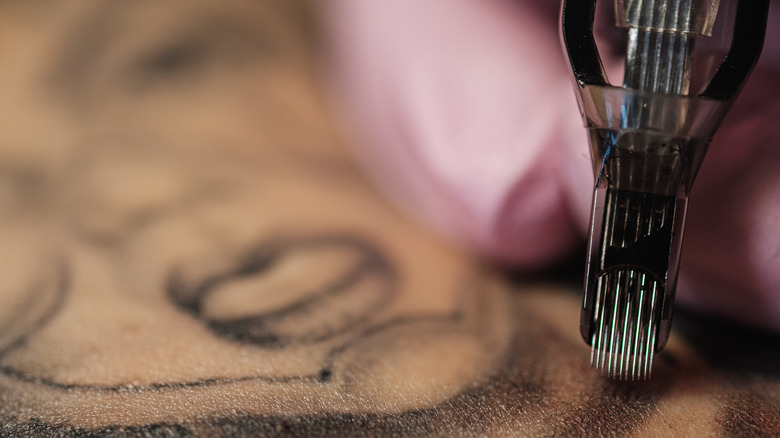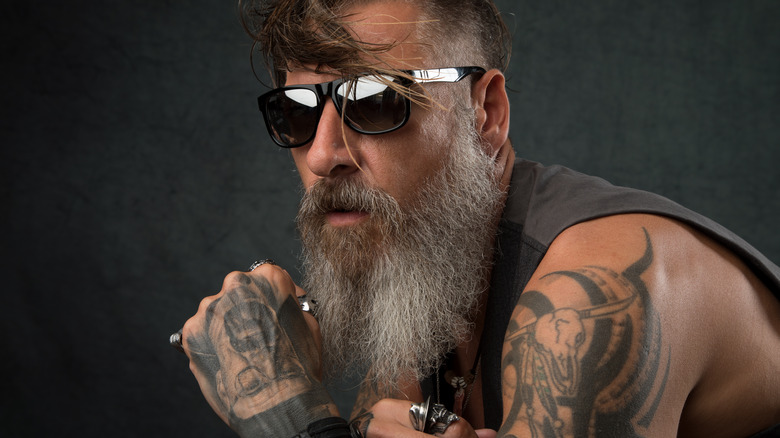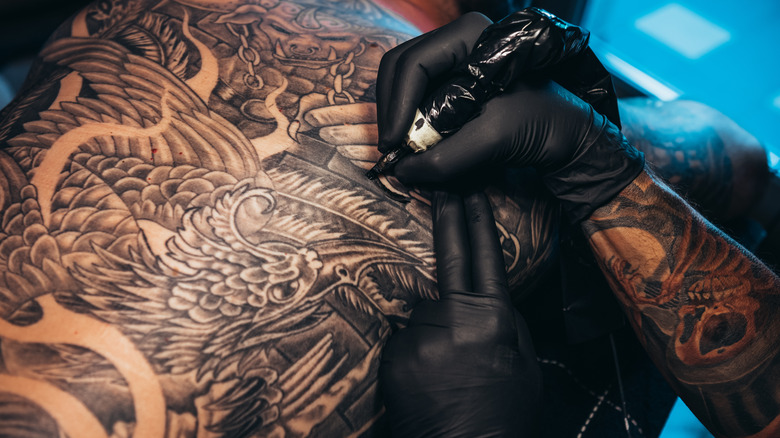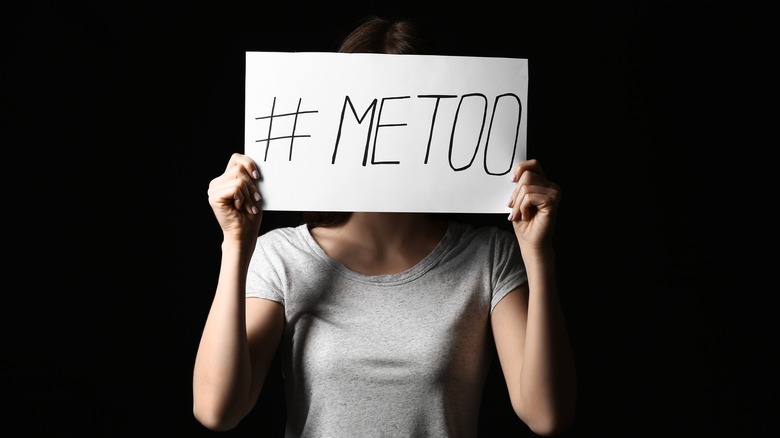Dark Secrets Of The Tattoo Industry
Tattoos are no longer taboo. They used to be subversive, an act of rebellion reserved for those on the fringe of society, according to the BBC. Not anymore. Tattoo stigma is fading, and you're now unlikely to be given the side-eye for having something permanently inked into your skin. More and more workplaces are also loosening their policies regarding visible body art.
But what lies under the skin of the tattoo industry? As getting inked becomes more of a thing, what really goes on in that chair has also come to the surface. What can be a right of passage for both the artist and the customer, the actual experience can be anything but.
While tattoos can be beautiful and intricate displays of individuality, there is a darker side to the industry behind the images forever emblazoned on human skin.
There are some unpleasant rites of passage
Before you can become a tattoo artist, you have to put in long hours and put up with low pay — even being hazed.
One tattoo artist (who prefers to go anonymous) at Atlanta's Gate City Tattoo calls the craft and the community a sort of exclusive club in an article for the shop's website. After months of trying to convince a Gate City artist he was for real, he was finally accepted for an apprenticeship. He had to straddle two gigs for most of his apprenticeship (thanks to him making very little money at the shop). For more than two years, he worked menial shop tasks and practiced his art incessantly before he was finally able to tattoo actual skin.
Emma Pierce, a tattoo artist at the San Francisco Bay Area's Glass Beetle Tattoo, went through a similar experience. She told KQED that she started her apprenticeship with an initial payment of $1,400 and then $200 a month for an entire year of 40-plus-hour work weeks. Since that alone wasn't going to pay the rent, she also worked at a coffee shop six hours a day before heading to the tattoo parlor for another 8-10 grueling hours that included cleanup and closing.
While Pierce feels she mostly escaped the hazing aspect that has unfortunately been inked into tattoo culture, the Gate City artist had it harder. He remembers having to prance around as Cupid in nothing but obnoxiously tight underwear and a pair of wings on Valentine's Day.
Not everything in the industry is regulated
There might be unregulated things going on even at the cleanest, most professional tattoo shops because there are many things the industry lets slide. The Public Health Post reveals that even the most diligent cleaning and sanitation can't fully prevent contamination and allergic reations.
While there are some government regulations that OSHA (the Occupational Safety and Health Administration) as well as state law have in place, such as sterilization requirements and health board checks, attempts to legislate regulation often end up falling apart, and the industry often has to regulate itself through coalitions. These coalitions may or may not keep clients and tattooers safe. Whatever suggestions they make are not mandatory, and neither is reporting anything that goes wrong, such as poisoning or infection. The FDA only becomes aware of an incident if someone voluntarily reports it, so there is no way for them to know everything that goes down.
A study published in Current Problems in Dermatology found that ink and pigment production is unregulated in the United States, while the regulation of tattooing itself varies state by state. There are risks for both clients and tattoo artists. While the FDA does go public about tattoo reports and recalls, there is no federal law requiring this.
Needles could be poisonous even if they look legit
Not all needle suppliers are the same. Some have no concern about potential health hazards, while others may not realize that even the highest quality needles may still be dangerous.
Body Art & Soul, a studio with shops on the East and West Coast, warns wannabe tattoo artists to beware of cheap tattoo kits that suspiciously cost less than a single piece of professional equipment. They aren't even meant for use on human skin — but you wouldn't know that unless you read through the nearly illegible disclaimers. Supposedly for use on fruit or artificial skin, these kits seem like a way of living the dream for someone who wants to break into the business, but they are nothing more than cheap, flimsy needles and toxic ink.
It doesn't stop there. Tattoo needles from reputable manufacturers have now been found to be prone to breaking down when they come in contact with certain inks, if you ask a team of scientists from the European Synchrotron (ESRF), among other institutions, who published a 2019 study in Particle and Fibre Toxicology. They tested inks ad nauseam but then turned their attention to needles, many of which contained chromium and nickel. Human skin doesn't usually tolerate either of these metals well.
What the scientists finally discovered was that inks containing titanium dioxide were much more abrasive to the needles than carbon black, and nanoparticles of nickel and chromium from needles that broke down were released into the skin. Ouch.
Inks from the wrong manufacturer could also be poisonous
The absence of regulation in the tattoo industry also extends to the ink, and some inks could end up poisoning clients or causing infections.
As the Associated Press reports, in 2014 the FDA issued a warning about tattoo inks from White and Blue Lion Inc. after it recalled unopened bottles of ink that were breeding harmful bacteria. This doesn't just happen after getting fresh ink. Sometimes, contaminated inks have been found to have adverse effects years after a tattoo was done. You could also find the most sanitary tattoo parlor around and still end up with an infection if the ink is unknowingly contaminated. Scary. As the AP notes, there was already at least one skin infection connected to the contaminated products, as well as the FDA also on alert for other tattoo inks reported to have caused infections.
Even if the ink is not swarming with pathogens, Scientific American warns that heavy metals such as mercury, cadmium, and iron oxide can be lurking in some inks, especially red, though other colors are also guilty of this. The study in Current Problems in Dermatology also reported on issues with tattoo pigments. Some newer inks are made of ingredients that haven't even been properly tested to determine whether they are safe for human skin. Though the FDA has regulation power for this, the researchers involved in the study noted that it stays out of such situations because of the alleged lack of evidence.
Some states have zero regulations
As Cronkite News reveals, Nevada and Maryland lack restrictions on businesses that involve tattoos and piercings. Any unlicensed artist can tattoo someone. Neither state has restrictions on minors walking in the door or sterilizing needles, while 10 other states, including Arizona, are borderline unregulated.
Unsterilized needles could mean the spreading of diseases like hepatitis or HIV. This explains why Arizona reps have been vying to pass a regulation bill, even though the state has been notorious for pushing back against proposed regulations whenever it can. Things previously so got heated that an Arizona tattoo artist who had enough urged former representative Eric Meyer (a doctor himself) to start cracking down. The bill that Meyer tried to put through never made it, and neither did the revision that lifted some of its more stringent requirements.
The Centers for Disease Control and Prevention (CDC) may not be able to regulate the tattoo industry, but like the FDA, they keep alerting the public. According to the CDC, using non-sterile water in tattoo inks ha presented contamination issues. In this case, the inks may cause no harm on their own, but there have been issues with artists diluting them with water to get the right shade. Bacteria still thrive in water that is safe to drink. Inject it into the skin, however, and it can end up in a severe infection that sometimes needs surgery to remove.
When artists make mistakes, they probably won't tell you
Tattoo artists are only human. Sometimes, they do make minor mistakes, but a really skilled artist will know how to cover it up — and you may never find out.
Most errors that are literally just skin deep actually have easy fixes, according to Inside Out Magazine. These are more common than you might think. Sometimes, even the most experienced and precise tattooer might falter with things such as line work. In other scenarios, sudden movements from a client who feels the pinch might make ink go awry. Tattoo artist Brittany Randall told Inside Out that if she knows she screwed up on a line, she will thicken it slightly, then work that into the other side of the image to make sure it turns out symmetrical. Making mistakes vanish is an art in itself because it involves using certain techniques to cover up imperfections in others.
In his book, "The Social Semiotics of Tattoos: Skin and Self," Chris William Martin interviewed tattoo artists for their take on the craft, and screwups happen. He was told by one artist that she starts to panic if the shading is too dark, but that she reminds herself that her artistic experience has her back. Having a strong grip on art and aesthetics can save a tattoo.
As tattoo artist Seven McDougall of Portland's Rose Water Tattoo told Inside Out, "Mistakes are made all the time. No artist on earth is perfectly flawless."
Sometimes, a tattoo artist will put anything on your body
Tattooing is a business like any other. While there are artists out there who will turn away choices they think you might regret, many will not, because it pays the bills.
There are some tattoos Inked Magazine thinks you probably shouldn't get. However, there are also artists willing to take advantage of customers who might be underage or inebriated (or both), as Allure Magazine reports about an incident involving Demi Lovato. When the singer covered up a questionable tattoo she regretted, the original artist attacked her on Instagram. Her response? "You tattooed a very intoxicated 18-year-old on a tour bus without the proper [judgment]."
There are also problems with plagiarism in the industry. Do your research, because as tattoo artist Steph Sparrow of Roses & Rivets in Santa Paula, California, could tell you, there are some tattooers with hazy ethics when it comes to claiming designs as theirs. She remembers "a particularly shady coworker, a self-titled 'master artist'" who would rip images from Google and show them off like they were his own. He was also the type to push customers into making such a permanent decision so he could book more appointments for those same images.
It gets worse. Sparrow's coworker would also get the most money he could out of customers by using diluted inks (remember the dangers of unsanitized water) so the tattoos would require a touch-up sooner, because they inevitably faded.
It's a physically exhausting job, even if it doesn't appear to be
Tattoos can range from symbolic words to visual dreamscapes, but beneath its beauty, tattooing is also physically demanding on the artist who has to use heavy tools and stay hunched over for hours and hours.
There are actually no chairs designed specifically for tattoo artists, according to Ohio State University. They usually modify existing furniture such as dentists' chairs for themselves and massage tables for their clients. Sessions can last up to eight hours depending on how elaborate the tattoo is going to be, and there are often few breaks, if any. Researchers from Ohio State, who published a study in Applied Ergonomics, observed tattoo artists at work and monitored what happened to them physically by attaching electrodes to parts of their bodies.
Every tattooer participating in the study broke recommended exertion limits, with neck, shoulder, and upper back pain being the most severe. This wouldn't surprise veteran tattoo artist Debra Yarian. She admitted to Allure Magazine that she suffered from chronic pain in the areas covered by the study and also her hips, forearms, wrists, and hands, and that tattooing had previously given her carpal tunnel syndrome.
Allure interviewed several tattoo artists who had all gone through chronic pain. It isn't just about the position they are sitting in, but the fact that it is not a dynamic position. Not much movement is going on when an artist is intensely focused on getting a design right.
Most artists don't want to risk their reputation because you're a walking ad for them
Want face tats like Post Malone? Think again. There are some tattoos that many reputable artists refuse to do because they would either put their careers on the line or feel it's immoral. These include hand, finger and — yes — face tattoos.
Even famously squeaky-clean pop star Justin Bieber had his face inked. According to The Statesman, it used to be only the most diehard tattoo fans who would venture to their face after they had used up most of the real estate on the rest of their bodies, but face tattoos are on the rise. Some clients want to get their first tattoo on their face before anything else. Even tattoo artists who will tattoo faces, like John Brady of Manhattan's Addiction NYC, are not about to put just anyone in the chair without careful scrutiny. Brady told The Statesman that he only accepted a fraction of the requests that came his way.
"The only person who's going to tattoo someone's face who isn't heavily tattooed is a super unprofessional artist," he said. "It's my business — so if I ruin you, it's going to ruin my reputation and my business."
Other tattoos that are taboo for many artists include finger tattoos, according to premier Australian tattoo parlor AuthentInk. The thing about hands is that they almost never rest. That doesn't give them time to heal properly, which is problematic for many tattooers.
There are tattoo artists who still refuse to ink darker skin
It sounds backwards, but people of color have been long overlooked in the tattoo industry, and many tattooers have not even inked dark skin before.
Melanated skin being more difficult to tattoo is actually a myth. It just needs to be approached differently, according to Allure Magazine, not only for ink to show up on darker skin tones but also to prevent scarring. Ignorant tattoo artists have been known to get much more aggressive with needles and traumatize dark skin from going at it too hard. This can have a negative impact on how the tattoo heals. Those with darker skin tones are more prone to keloids, or thicker, textured scars, because their larger collagen-producing cells can sometimes lose control and cause the overgrowth of scar tissue. Another misconception is that dark skin hides mistakes.
"People don't think they have to be precise when they tattoo brown skin because it 'hides more imperfections,'" Delaware tattoo artist Oba told Allure. "Why are there imperfections? Answer that question."
NPR, which interviewed several tattoo artists who ink darker skin, notes that the quest to find the right tattoo artist can be more difficult for people of color. Tattoo artist Tyler Brewer of Maryland's Kensington Tattoo told NPR that he'd "seen artists pretty much give the blow-off to clients because they were ... a different color." Brewer also believes that tattoo artists should learn which techniques work best on different skin types.
Sexual abuse plagues the industry
There is another way tattoo parlors may not be safe, and this has nothing to do with needles and inks.
In 2018, Jezebel interviewed Katie (who preferred not to use her last name) and others who were sexually assaulted by Detroit tattoo artist Alex Boyko. Not only did Boyko touch her inappropriately, but she recalled how he cornered her with a rather indecent proposition, including a discounted tattoo if she went through with it. Boyko initially denied the allegations on social media. Later, he posted a public apology to his Instagram account.
The #tattoometoo movement emerged on Instagram as a result of survivors speaking out. Revered tattooer Isaiah Camacho came under fire, according to the New York Times, after dozens of reports from victims who told police he had raped or sexually assaulted them. Some of these reports waited far too long. The recent prosecution of Camacho proved difficult because many of the cases were from years ago, and as prosecutor Kent Volkmer told the Times, "We just don't believe, given all the inconsistencies, that we can convince a jury."
If you or anyone you know has been a victim of sexual assault, help is available. Visit the Rape, Abuse & Incest National Network website or contact RAINN's National Helpline at 1-800-656-HOPE (4673).
